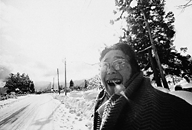Magino Village—A Tale
(“Sen nen kizami no hidokei: Maginomura monogatari”) JAPAN / 1986 / Japanese / Color / 16mm / 222 min
JAPAN / 1986 / Japanese / Color / 16mm / 222 min
Director: Ogawa Shinsuke
Photography: Tamra Masaki
Sound: Kubota Yukio, Kikuchi Nobuyuki
Music: Togashi Masahiko
Producer: Fuseya Hiroo
Cast: Hijikata Tatsumi, Miyashita Junko, Tamura Takahiro, Kawarasaki Choichiro, Ishibashi Renji, Shimada Shogo
Production Company: Ogawa Productions
Source: Yamagata Documentary Film Library
Thirteen years in the making, this is Ogawa Productions’ masterpiece. Few films—anywhere, anytime—have rendered history with such complexity. Oral traditions that have circulated in Magino Village for generations are related through storytelling, butoh dance, and fictional recreations. The latter mix famous actors with the villagers, who take the roles of their own ancestors. The filmmakers go so far as to explore the furthest reaches of Magino’s history in an archeological dig out in the rice fields. This kind of science adds a perspective that somehow avoids feeling like a cold demystification of the folkloric and spiritual dimensions of village life. The scientific microscopy of rice flowers inspires speechless awe, and when university professors suddenly burst out of the bushes to explain the likely origins of a story, they only end up confirming the reality of Magino’s living history. The entirety of this superbly complex film is clocked by the rhythm of the har-vest seasons and the sun’s arc across the vast Yamagata sky.
Abé Mark Nornes
—from the YIDFF ’99 official catalog
 Ogawa Shinsuke
Ogawa ShinsukeBorn in Tokyo in 1936. Served as assistant director at Iwanami Productions from 1960, and participated in Ao no Kai with Higashi Yoichi, Iwasa Hisaya, Kuroki Kazuo, and Tsuchimoto Noriaki. Became freelance in 1964 and began producing films independently with Sea of Youth (1966) and A Report from Haneda (1967). Films were supported at workplaces and universities throughout Japan in the midst of the Zenkyoto student movement. Founded Ogawa Productions in 1968 and lived in the farming village of Sanrinzuka while producing the Sanrinzuka series. Continued making films from the viewpoint of farmers. In 1974 moved to Magino in Yamagata Prefecture’s Kaminoyama City, and made A Japanese Village—Furuyashikimura (1982) and Magino Village—A Tale while growing rice and observing life in a farming village. His dedicated work as organizing member of the first YIDFF in 1989 was instrumental to the festival’s success. He passed away on February 7, 1992. |
• Special Invitation Films | DV2 | Sound of Brasil | Number Zero | <In Memory of Maeda Katsuhiro> Polluted Japan, Free Kwangju | Magino Village—A Tale |
